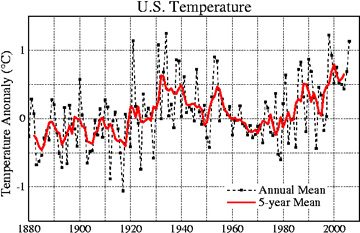NASA admits to error in global warming data
NASA admits to error in global warming data
mongabay.com
August 17, 2007
NASA has admitted to a data error that skewed temperatures since 2000.
According to the new estimates, the hottest year since 1880 is 1934 instead of 1998, which is now second. 1921 is now third, followed by 2006, 1931, and 1999.
The error was brought to NASA’s attention by Steve McIntyre, a Canadian blogger for Climate Audit.
The change has little effect on global temperature records and the average temperatures for 2002-2006 (at 0.66 ºC) is still warmer than 1930-1934 (0.63 ºC) in the United States. NASA said there is still evidence that temperatures are trending upward.

|
NASA said the error resulted from a switch to a new data-collection system in 2000 and a false assumption that the old and new methods matched.
McIntyre criticized NASA for not making a formal announcement on the change.
“They have managed it rather poorly,” The Guardian quoted McIntyre as saying. “I come from a background where you have to announce bad results. They might not like the fact they made a small embarrassing error but if it was me I’d have announced the results and put the best spin on it that I could. I would not have left myself open to the suggestion that I was not being forthcoming.”
NASA said that accusations from climate skeptics of a cover up are unfounded, according to CanWest News Service.
“This is not a hundredths of a degree issue. This isn’t some kind of statistical quirk. It’s very, very clear [that global warming is happening],” Gavin Schmidt, a climatologist at NASA’s Goddard Institute for Space Studies, told CanWest News Service in a phone interview. “A lot of this is because people are making that confusion, and some people are deliberately making that confusion to make [the correction] seem like a bigger deal than it actually is.”
The revision comes roughly a year after NASA announced delays in the next generation of satellites needed to monitor Earth’s changing climate and environment.
Mean global temperature data still show the 2005 is the warmest year on record. Further, the 5-year mean temperatures in the U.S. continue to show a warming trend.

Top ten annual temperature years in the US (Celsius degrees from mean):
| rank | year | degrees from mean | annual 5-year mean |
| 1 | 1934 | 1.25 | 0.44 |
| 2 | 1998 | 1.23 | 0.51 |
| 3 | 1921 | 1.15 | 0.15 |
| 4 | 2006 | 1.13 | N/A |
| 5 | 1931 | 1.08 | 0.27 |
| 6 | 1999 | 0.93 | 0.69 |
| 7 | 1953 | 0.90 | 0.32 |
| 8 | 1990 | 0.87 | 0.40 |
| 9 | 1938 | 0.86 | 0.36 |
| 10 | 1954 | 0.85 | 0.47 |
Top ten ranking for the 5-year means
| rank | year | degrees from mean | annual 5-year mean |
| 1 | 2000 | 0.52 | 0.79 |
| 2 | 1999 | 0.93 | 0.69 |
| 3 | 2004 | 0.44 | 0.66 |
| 4 | 2001 | 0.76 | 0.65 |
| 5 | 1932 | 0.00 | 0.63 |
| 6 | 1933 | 0.68 | 0.61 |
| 7 | 2003 | 0.50 | 0.58 |
| 8 | 2002 | 0.53 | 0.55 |
| 9 | 1998 | 1.23 | 0.51 |
| 10 | 1988 | 0.32 | 0.51 |